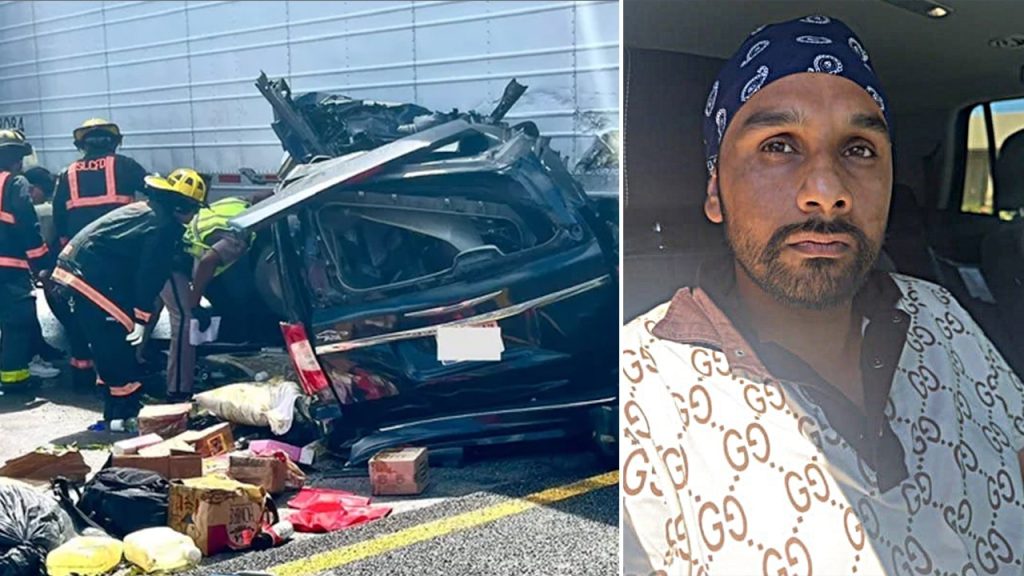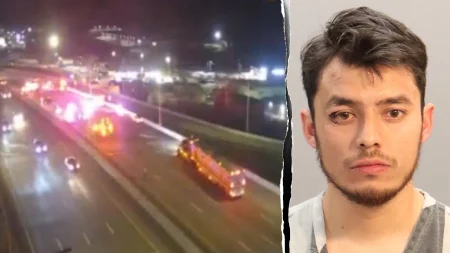Florida Judge Denies Bond to Undocumented Truck Driver in Fatal Crash Case
In a decisive courtroom moment that highlights the intersection of immigration policy and public safety, a Florida judge denied bond to Rajinder Singh, an undocumented truck driver from India charged with causing a deadly crash that claimed three lives. The ruling, delivered by St. Lucie County Judge Lauren Sweet, underscores the serious nature of the charges while raising questions about immigration enforcement and transportation safety regulations in America.
Judge Sweet’s decision was firmly rooted in two key considerations that weighed heavily in the proceedings. First, she identified Singh as “an unauthorized alien” who presented “a substantial flight risk,” suggesting that releasing him might jeopardize the justice process. Second, and perhaps more significantly, she found probable cause for all six charges against Singh – three counts of vehicular homicide and three counts of manslaughter – classifying them as forcible felonies under Florida law. The gravity of these charges led to her unequivocal statement to Singh: “There are no conditions of release that will ensure your appearance at trial. Therefore, sir, I’m setting your bond on each charge at no bond.” The defendant, appearing virtually from St. Lucie County Jail with assistance from an interpreter, seemed to grasp the severity of his situation as the judge’s words effectively ended any possibility of pre-trial release.
The tragic incident that brought Singh into the courtroom occurred on August 12, when investigators say he attempted an illegal U-turn with his semi-truck on the Florida Turnpike. This dangerous maneuver caused his truck to jackknife across the northbound lanes, creating an unavoidable obstacle for other motorists. A minivan subsequently collided with the trailer, resulting in the deaths of all three occupants – lives cut short in an instant by what prosecutors characterize as reckless decision-making. The investigation led to Singh’s arrest in Stockton, California, from where he was extradited back to Florida to face justice for the deaths his actions allegedly caused. During the hearing, Singh hesitated when asked if he wanted legal representation, prompting Judge Sweet to provisionally appoint the public defender’s office to represent him – ensuring that despite his immigration status, his right to counsel would be preserved.
This case has drawn particular attention not only for its tragic outcome but also because of Singh’s immigration history, which has become a focal point in discussions about border security and vetting processes for commercial drivers. According to Tricia McLaughlin, Homeland Security Assistant Secretary for Public Affairs, Singh entered the United States illegally in 2018, crossing the southern border before obtaining a commercial driver’s license in California. His application for work authorization was initially rejected during the Trump administration on September 14, 2020, but the implication in the reporting suggests he may have received authorization during the Biden administration – though this detail remains a point of contention and has fueled debate about immigration policy changes between administrations.
The deadly crash in Fort Pierce has consequently become more than just a tragic accident case; it has evolved into a flashpoint in ongoing national discussions about immigration enforcement and transportation safety. Critics argue that this incident represents a failure in the system that allowed an undocumented immigrant to obtain a commercial driver’s license and operate heavy vehicles on American highways, potentially without adequate training or vetting. Others point to the need for more comprehensive trucking regulations and enforcement, regardless of a driver’s immigration status, suggesting that the focus should be on preventing dangerous driving behaviors through better training, monitoring, and accountability for all commercial drivers.
As this case moves forward through the legal system, it serves as a somber reminder of how policy decisions at the national level can have profound consequences in individual communities. The three victims, whose names were not mentioned in the hearing coverage, leave behind families and friends whose lives are forever altered by this tragedy. Meanwhile, Singh faces the prospect of significant prison time if convicted, his own future determined not just by his actions on that fateful day in August, but also by the complex interplay of immigration law, criminal justice procedures, and public sentiment about undocumented immigrants in America. The judge’s decision to deny bond ensures that Singh will remain incarcerated as the case progresses, providing some measure of assurance to the victims’ families while the legal process unfolds to determine ultimate accountability for this devastating incident on Florida’s highways.








